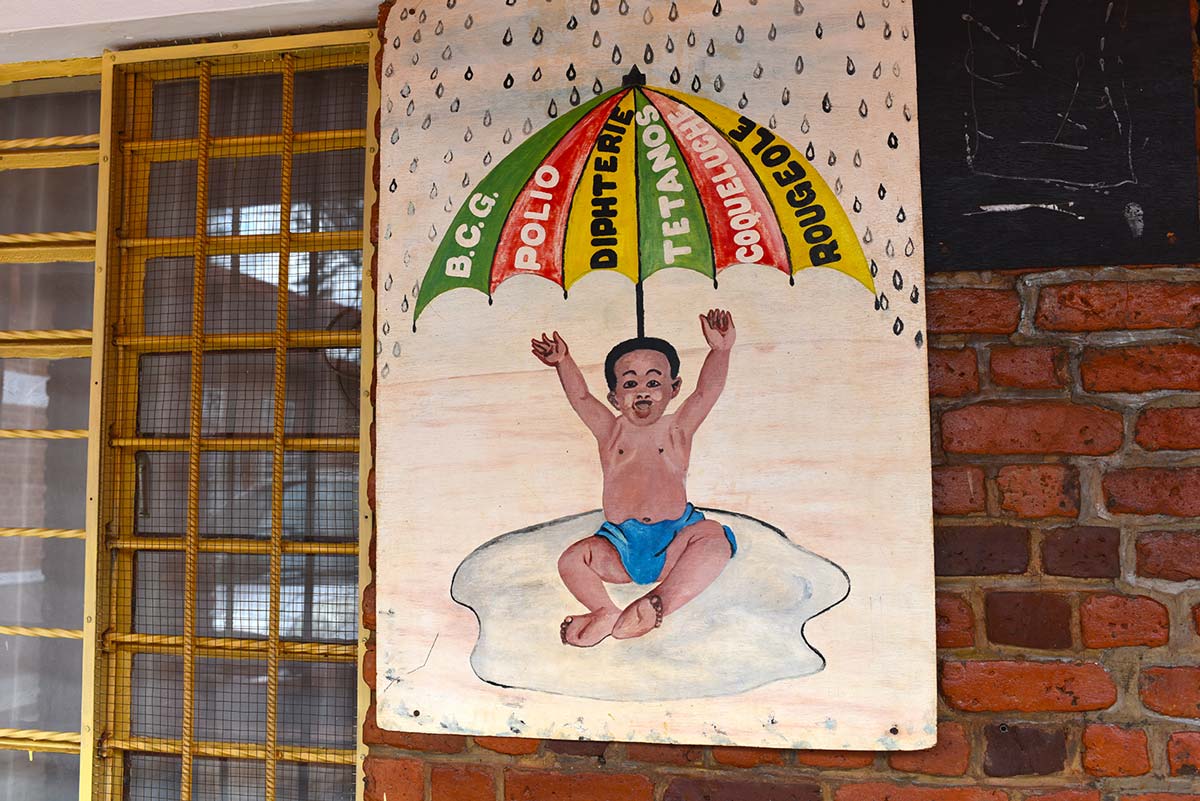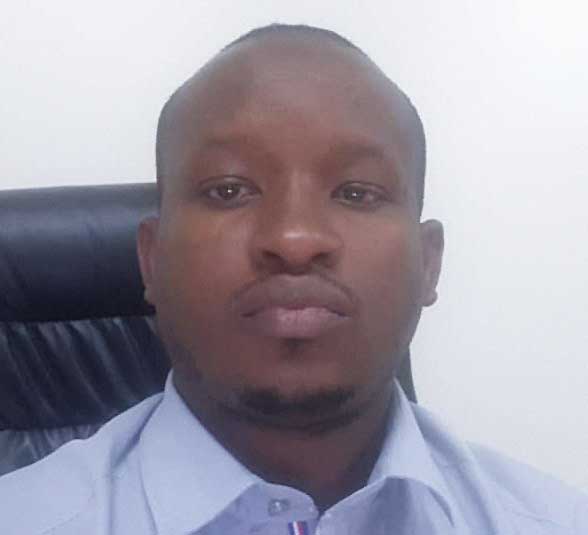Rwanda’s efforts to strengthen its health system paying off in midst of COVID-19 pandemic
The country has made strategic investments including supply chain strengthening and technological innovation, all of which have allowed critical immunisation activities to continue during and beyond the quarantine.
- 20 May 2020
- 7 min read

 |
Sibomana Hassan works for Rwanda’s Ministry of Health and is responsible for coordinating all immunisation-related activities in the country, including supply chain management of vaccines, advocacy with decision-makers and mobilising communities to make sure all children in Rwanda are vaccinated. |
What impact has the COVID-19 pandemic had on immunisation in Rwanda?
Like many countries around the world, Rwanda is fighting an invisible enemy. We’re seeing disruptions in our immunisation operations and the percentage of our population being reached with vaccines has fallen.
The government took the decision to lock down all activities on 22 March, and by the end of the month we started to see a decline in parents seeking immunisation services for their children. Now that everyone is instructed to stay at home to make sure we avoid the spread of COVID-19, we’re missing some children who are not coming to health clinics. As an example, in February, we had 92 percent coverage of the second dose of the measles vaccine, and when we analysed data last month, we observed that the coverage had dipped to 82%.
Similar to parents of young children, health workers are worried about putting their health at risk, and many of them are reluctant to go to work, despite government measures like providing them with free transport.
How do you get around these kinds of challenges to reach children with vaccines?
Despite the dip in demand, Rwanda is in a good position as far as the supply of vaccines. In fact, we had enough vaccine doses at the beginning of the pandemic to cover the whole country for six months without stock outs.
We’re also actively distributing vaccines to districts across the country, which is important because during the lockdown nobody is allowed to go outside, but we’re lucky that we can travel outside Kigali to deliver vaccines.
In general, we’re trying to work at the district and community level to ensure that no scheduled vaccinations are canceled. Also, in the past, we’d hold large, open vaccination sessions, but now, to keep with social distancing measures, and minimise the risks of parents not showing up at a designated date, we’re vaccinating children opportunistically when they visit health centers.
Immunisation has to continue. Imagine a scenario with COVID-19 plus an outbreak of a vaccine-preventable disease like measles?
We’ve also instructed health facilities to continue vaccination activities, but they have to make sure that safety of the community and health workers is assured.
Ultimately, we know there will be a reduction in the number of children vaccinated, but because we’ve moved to an electronic immunisation registry, it’s very easy to track how many children we’ve missed, down to their names, their villages and their parents. So, we’re hopeful that even though there will be a reduction in the children vaccinated after the lockdown we will be able to identify each and every one we’ve missed, and vaccinate them, especially because we have a good channel through our network of community health workers.
Has the electronic tracking system been rolled out in all health facilities?
Yes, and it’s web-based, so on any given day I can go online and see how many children have been vaccinated across all health facilities. It hasn’t been an easy transition from the paper-based system, but we’re determined to push through and have a fully-functioning electronic system. It should be manageable because the costs are manageable; mainly IT equipment and training people to navigate the system. We’re also integrating birth registration into the system, so that we can make sure every child born is vaccinated. And we have a plan to integrate text message alerts to remind parents to bring their children back for vaccination.
Are there any other measures that are proving useful in the current pandemic?
When the countrywide quarantine began, we were in the process of upgrading our supply chain system, because before district hospitals used to come and collect vaccines on a monthly basis from central hospitals. But with our system redesign we’re delivering vaccines to health centers across the country instead of having them come to Kigali.
We deliver vaccines once a month using refrigerated trucks, purchased with support from Gavi. This is important because it helps ensure the vaccines are kept within the designated temperature range to maintain their potency. There are two staff members involved in this transport: the driver and the person responsible for vaccine distribution who checks stock levels at individual hospitals and clinics, to ensure that there are no stock outs or overstock.
This maximises efficiency and saves health centers time and money that would be otherwise spent on transport back and forth from the vaccine collection point in Kigali. Now we’re using one truck and one route to distribute vaccines to seven or eight health facilities. This is ideal in the current situation, because it reduces the points of contact and minimises the potential to spread COVID-19.
You’ve talked about routine immunisation activities, but Rwanda also has a human papillomavirus (HPV) vaccine programme to protect girls against the leading cause of cervical cancer. Can you tell us more about it?
The HPV vaccine programme was launched in Rwanda in 2011 to a very positive public response. This is mainly because we conducted a three-year information and sensitisation campaign that helped people understand the life-saving importance of the vaccine.
To reach as many school-age girls as possible, we involved several stakeholders: we had committees responsible for different aspects of the introduction; from social mobilization to planning, monitoring and evaluation and another in charge of coordination.
The Ministry of Health also has close ties with the media and non-profit organisations and we worked with them on creative campaigns like radio shows and community plays to build demand and address any concerns around the vaccine. These information campaigns have continued beyond the launch and are very effective in helping us sustain and improve immunisation coverage in the country.
Read more: New partnership launched to increase uptake of life-saving vaccines in Rwanda
And of course, because this was a new vaccine for a new target group, that would be delivered outside of the traditional health infrastructure, we needed to coordinate closely with the Ministry of Education, not least because we needed to align the HPV vaccination schedule with the school calendar.
Are you worried that the current pandemic will disrupt the progress you’ve made?
In Rwanda, there is a system of delivering HPV vaccines through schools. We provide girls across the country with two HPV vaccine doses, both within the space of a year: the first dose is given in the end of March and the second in September. But now that schools have closed, we’ve missed the window to distribute the first dose of the HPV vaccine.
Once the lockdown lifts, and schools reopen, we plan to give this first dose, but it will disrupt the vaccination schedule, because we will need to maintain the six-month interval between doses and some girls may no longer be eligible.
Why is it so important to keep up immunisation activities in the current crisis?
Immunisation has to continue. Imagine a scenario with COVID-19 plus an outbreak of a vaccine-preventable disease like measles? It would be extremely difficult to respond to and manage that outbreak. This is why we’re relying on vaccination programmes; to make sure there is no gap in fighting vaccine-preventable disease.
With the uncertainty around the COVID-19 pandemic, what gives you hope?
In Rwanda, we’re very optimistic that we’re going to defeat COVID-19 in the near future. Thanks to diligent contact tracing on the part of the government, we’ve been able to contain cases, which gives me hope that we’ll be able to bring this pandemic under control in the near future.
And for its part, Gavi is helping us deal with the pandemic in a practical way. Rwanda has the opportunity to use some of the performance-based financing we receive from Gavi to respond to COVID. I can’t express how critical this flexible funding will be during this challenging period.





